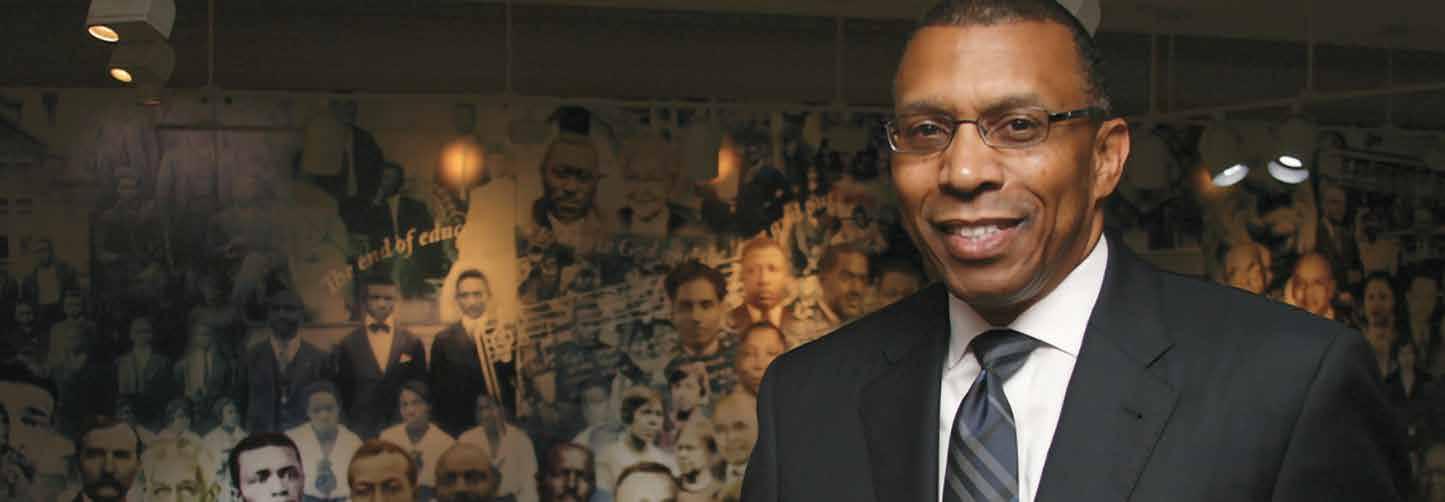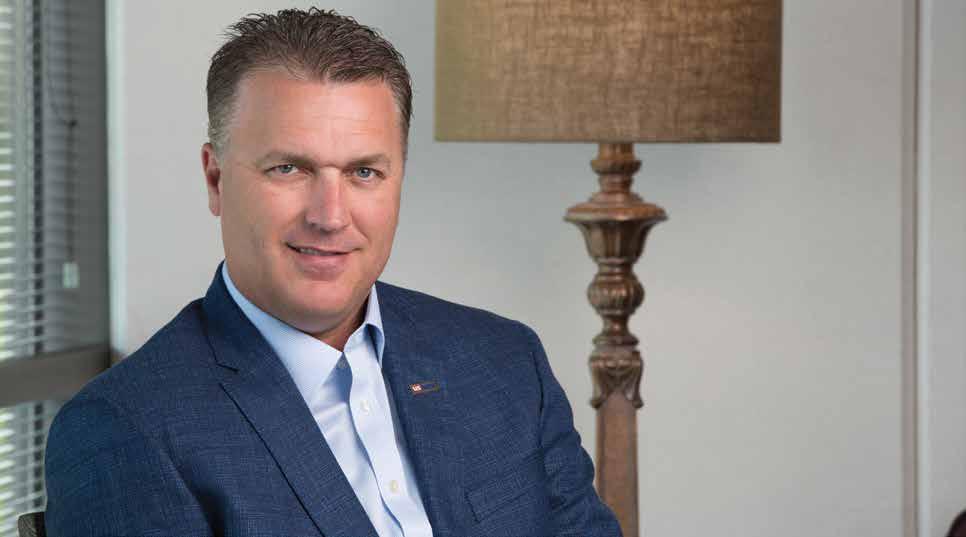
8 minute read
A Discussion on Diversity: The Banking Community is Looking to Learn and Lead






THE BANKING COMMUNITY IS LOOKING TO
LEARN AND LEAD
In the last 18 months, the national push for racial diversity, equity and inclusion (DEI) in the corporate workforce has been a visible, tangible, and intentional effort. Arkansas is no exception, and the banking industry has been at the forefront of the conversation – and actions – to change the business culture.
“We are having more of those conversations than we used to have. They're much more plentiful,” says Dr. Laurence Alexander, chancellor of the University of Arkansas at Pine Bluff, the nearly 150-year old historically black college and university (HBCU). “I'm glad that others are recognizing that the time has come. Some of us who've been working at this for many years are applauding that it's high time that we give attention to this because diversity enhances the workforce in some very profound ways.”
The George Floyd killing in Minneapolis that was caught on video was an inflection point for some of this change. The seminal event provided undeniable proof of the disparities that many people of color claimed existed in America. Calls for action combined with statistical demographics of a growing multi-ethnic younger generation left little room for the business community to do nothing in response.
“After the George Floyd killing in Minnesota, I think it caused a number of people to look at this whole issue differently,” Alexander said, “I can't directly connect it to this activity other than the timing… And let me be clear: it's welcomed. This kind of attention to students who attend HBCUs. It's a welcome sight to get a call or to get a visit or to get an email from a banker or an executive who is interested in diversifying their workforce and recognizing that, ‘Hey, I've got a real opportunity here to connect with a land grant HBCU that's right here in the state of Arkansas who's educating a number of our students and who's educating the Arkansans, who's educating residents of Arkansas.’ These are good students and they'll be good employees and they'll probably not have a hard time retaining them because they are from Arkansas and they love the state.”
Alexander said his school has a great longtime relationship with two Pine Bluff-based banks: Relyance Bank and Simmons Bank. Not only have those banks provided internships and scholarships over the years, they absorb a number of quality graduates from UAPB. Alexander hopes a newly-launched MBA program will further the pipeline of talent his school can provide to the banking and business communities.
Nationally, there have been controversial debates on a variety of tangents related to the whole issue of DEI. How deep is the talent pool to recruit minorities to a company? Once recruited, are there

Dr. Laurence Alexander
Chancellor of the University of Arkansas at Pine Bluff photo courtesy of UAPB
enough opportunities for advancement? Are the efforts being made a permanent corporate culture change or part of a to-do checklist?
Scott Hamilton, Urban League of the State of Arkansas CEO, says a commitment to diversity must come from the top leadership.
“It's got to come from the C-suite. It has to be resonating from the CEO throughout the company. Without it, it's not going to work,” he said.
Hamilton, 55, serves on a business advisory board at Philander Smith College, another one of Arkansas’ four HBCUs. He’s worked in the utility business for years in Little Rock, Kansas City and Detroit. Currently, Hamilton is involved in a number of entrepreneurial efforts in addition to his Arkansas Urban League role. All of those experiences have led to mentoring roles for younger people of color.
“I think a lot of companies now are very active in terms of recruiting and seeking diverse candidates. They’re recruiting at that entry-level space. That's not a bad thing, but that's not the problem,” he said. “In fact, you will see in a lot of corporations that there's almost a revolving door. You see a lot of folks come in and a pretty good mix of young diverse candidates, but they're rotating right out. And what they're rotating to is one of two things. They're rotating to companies that show that they've got a good positive track to get up into the senior ranks of those corporations in expeditious time and there are young folks that really want to be engaged. So I think companies have to think about that.”
The impatience of youth aside, Hamilton contends that young people wanting to move into banking and other corporate jobs have to put in effort too. He advises students to think about how they are presenting themselves to older recruiters.
“We meet and talk with students to get them some input on things that they might want to do: communication skills, how to put together a resume – a quality resume that gets the attention of a recruiter – interview tips in terms of how to engage and communicate and share things that are important. A lot of times, kids may have a lot of non-curriculum work, volunteer work, but they don't talk about it. Those are the things that can make a difference, whether or not they can get into a company at the entry-level or not,” he said.
Mike Richardson, President of U.S. Bank’s Arkansas region, says as diversity efforts expand, local banks are lucky to have four HBCUs in state. In addition to UAPB and Philander Smith, central Arkansas is home to Shorter College and Arkansas Baptist College, where Richardson serves on the board of trustees.
“We're making a deliberate attempt to change our recruiting strategies. We're looking at working with our community outreach champions here in Arkansas that we formed in the last six to eight months,” Richardson said. “It’s a priority focus, working with HBCUs, through job fairs that historically we haven't participated in as much as we would like to and need to.”
Richardson said a big challenge for bankers is communicating the passion for making a difference to a younger, more diverse recruit. While numbers are a big part of the job, so is serving the community, and that can appeal to college graduates.
Richardson believes his input on the Arkansas Baptist board is important, but his takeaways from that service may be more meaningful.
“Some things I've done to try to get in and start understanding and share my own input. More importantly, I learn myself what I need to do to bring it back to the bank. Altogether, we just lift each other with that knowledge,” he said.
His bank has a number of major initiatives it is implementing, including several pilot programs to find better ways to recruit and retain more employees who are representative of the communities U.S. Bank serves. Richardson said a light bulb moment for him centered around industry statistics involving mortgage loan officers. Nationally, fewer than 5% of mortgage lenders were people of color.
“When you look at the number of the mortgage loan officers in the industry, it's just greatly underserved from the ones that need to be there. It just struck a nerve,” he recalled. “At the end of the day, we need to do a better job – particularly in the Black community, but in our BIPOC communities – of recruitment so that we can have that connection.”
Hamilton said that urban areas see the changing face of young workers more quickly than in smaller towns and cities, but he said all corners of the state have to be ready for the societal changes that are coming.
“We’re seeing across the state of Arkansas that small communities are diversifying. We're also seeing people that are moving from larger cities, other states, that are coming to Arkansas, and why are they coming here? A lot of times they want a small town. They want a small town feel. They want a quality of life where they could maybe raise their kids in a quieter environment… And with that, they're bringing their businesses, their ideas, they're bringing their money, and their expectation is that they're going to see a society that they may be more used to in a larger community,” he said.
“If communities expect to grow and are simply sustained, you've got to have some understanding and appreciation for how the world really works. You can't operate in just a small environment: ‘this is the way it's been, this is the way it's always going to be.’ I can guarantee you, it won’t always be the way it’s been,” Hamilton said.
DEI action has serious momentum right now, and Dr. Alexander is hopeful that a foundation is being built that will sustain this effort in perpetuity.
“We don't want this to be a one-time event. We don't want this to be where we have had some conversations for a year or so and then everything ends and it goes away. No one-offs here,” Alexander said. “We wanted to see a continual conversation. We want to have that conversation with business executives and leaders and continue that on into the future so that when we look back in two or three years or five years, we can actually identify and we can see the progress that we made.”

Mike Richardson










